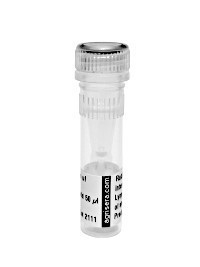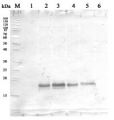1

Anti-FtsH9 | ATP-dependent zinc metalloprotease FtsH9 (chloroplastic)
AS06 130 | Clonality: Polyclonal | Host: Rabbit | Reactivity: Arabidopsis thaliana
Note: Limited stock
- Product Info
-
Immunogen: KLH-conjugated synthetic peptide derived from Arabidopsis thaliana FtsH9 protein sequence UniProt: Q9FIM2, TAIR: At5g58870
Host: Rabbit Clonality: Polyclonal Purity: Immunogen affinity purified serum in PBS pH 7.4. Format: Lyophilized Quantity: 2x200 µg Reconstitution: For reconstitution add 182 µl of sterile water Storage: Store lyophilized/reconstituted at -20°C; once reconstituted make aliquots to avoid repeated freeze-thaw cycles. Please remember to spin the tubes briefly prior to opening them to avoid any losses that might occur from material adhering to the cap or sides of the tube. Tested applications: Western blot (WB) Recommended dilution: 1 : 500 -1 : 1000 (WB) Expected | apparent MW: 87.8 | 74.36 kDa - Reactivity
-
Confirmed reactivity: Arabidopsis thaliana Predicted reactivity: Arabidopsis thaliana
Not reactive in: No confirmed exceptions from predicted reactivity are currently known - Additional Information
-
Additional information (application): Antibody recommended to be used on chloroplast and thylakoid samples. This antibody will not work with Chlamydomonas reinhardtii.
- Background
-
Background: FtsH protease is important in chloroplast biogenesis and thylakoid maintenance. Nuclear genome of Arabidopsis thaliana contains 12 genes encoding FtsH proteins. Three of those gene products in Arabidopsis , can be targeted to mitochondria (FTSH3, FTSH4, and FTSH10), while the other nine (FTSH1, FTSH2, FTSH5 to FTSH9, FTSH11, and FTSH12) can enter the chloroplast. Synonyme: cell division protease FtsH homolog 9, chloroplastic.
- Reviews:
-
This product doesn't have any reviews.
Accessories

AS11 1789 | Clonality: Polyclonal | Host: Rabbit | Reactivity: A. acetabulum, A. thaliana, B. hypnoides (ulvophytes), G. theta, H. vulgare, Synechocystis sp., T. pseudonana, Z. mays
Benefits of using this antibody
50% discount on matching standard/positive control
AS11 1789S FtsH2 | FtsH2 positive control/quantitation standard
Use promotional code: Stand50


